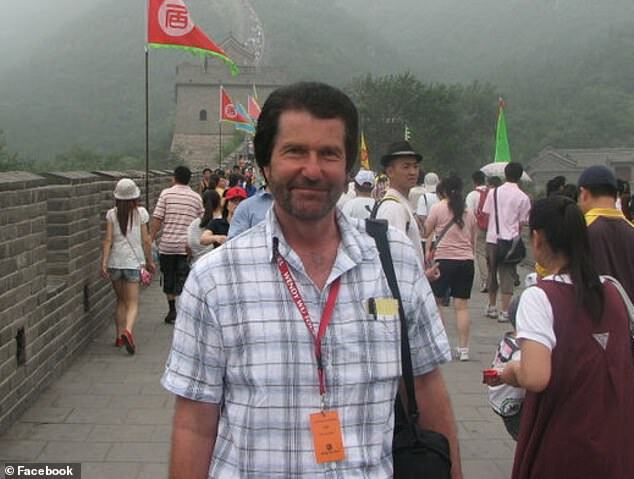A retired senior public servant of 45 years preyed on the economic disadvantage of young children in the Philippines, forcing them to perform sex acts for him online — or starve — an Adelaide court has heard.
Ian Ralph Schapel – who was a senior HR manager with the South Australian Department of Premier and Cabinet — has pleaded guilty to 50 offences, including 41 counts of engaging in sexual activity with a child outside of Australia, using a carriage service to access child exploitation material and possessing child exploitation material.
The 67-year-old engaged in 74 occasions of sexual activity with at least 13 children in the Philippines over platforms including Skype and WhatsApp.
The female victims were aged between three and nine years old.
Schapel also had more than 52,000 images and videos of child exploitation material in his possession
Commonwealth prosecutor Krista Breckweg said Schapel took advantage of families in the Philippines and paid a “paltry” amount of $30 on average for a live recording.
“He preyed on the economic vulnerability of the facilitators and the children, acknowledging that the communication was usually initiated by the adult women who contacted him asking for money to buy food or medicine,” Ms Breckweg told the court.
“The chat logs that accompanied established that the offender was directing the facilitators as to what he wanted the children do.
“The offender chose the Philippines where he could easily and readily access young girls for sex given their dire economic circumstances and the absence of efficient law enforcement aimed at protecting children from sexual abuse.”
She said if the facilitator – or parent – of the child victim did not meet his requests, he would threaten them including saying “you starve now”.
Schapel’s loneliness connected with hoarding
The District Court heard Schapel’s offending escalated when he retired from the public service in 2017.
He would take at least one overseas holiday every year.
Schapel’s lawyer Chris Kummerow said his client viewed his arrest in February last year as “a wake-up call”.
“At the time of the offences, Mr Schapel did not consider the moral question of his offending,” Mr Kummerow told the court.
“These conversations were a form of escape for Mr Schapel; this interaction was essentially not in the real world, it was somewhat of a fantasy world for him, it didn’t seem real to him at the time given his quite isolated and insular nature.
“He has come to realise that these are not victimless offences and that he has directly caused harm to these children.

Mr Kummerow said Schapel – who has been diagnosed with a hoarding disorder — was lonely and isolated and found a community online where he was free from judgement.
“There was a disconnect between who Mr Schapel was at work – confident, engaged, knowledgeable – he was the go-to man, to who he was at home – he was lonely, insecure, afraid of social contact,” Mr Kummerow told the court.
“The hoarding disorder essentially means that he collects these images like he collects various other legal non-pornographic collections over the course of his adult life.”
Mr Kummerow said Schapel accepted he would go to prison but was “keen and eager” to one day be released as a “productive member of the community”.
He said Schapel wanted to use his time inside to get treatment.
The court heard Schapel had to be moved in prison for his safety following a number of incidents.
Police wanted to seize house
Mr Kummerow also said the Australian Federal Police (AFP) had wanted to seize Schapel’s Mitchell Park house on the basis that “it was an instrument of the offending”.
“Their rationale – and to my knowledge, this has never been tested in Australia – is that it provides power and internet connection to facilitate the offences,” Mr Kummerow said.
“Noting that a number of these offences occurred while he was overseas, clearly it doesn’t require the house for the offences to be committed.”
He said a deed of settlement in the Supreme Court had since allowed Schapel to pay half the value of his house — $165,000 — to the AFP but keep his house.
Commissioner for Victims’ Rights Bronwyn Killmier said Schapel’s offending was “a violation of human rights” in a community impact statement that was read to the court.
“He was not a bystander but rather an active participant and manipulator,” she wrote.
“While the offender may be thousands of miles away, they are responsible for the abuse and exploitation of children for their own gratification.
“Victims and facilitators are often in countries of high levels of poverty, unemployment and job instability so the cost for offenders is relatively low.
“Thus the cycle of abuse is perpetrated by economic imbalances and results in lifelong damage for the children victims.”
The court heard Schapel had no prior criminal history.
Judge Paul Cuthbertson will sentence Schapel in February.
abc




